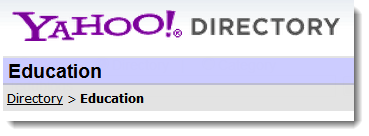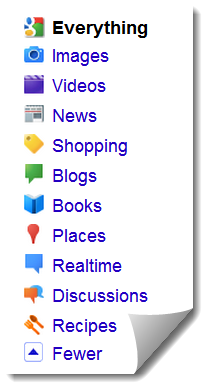Remember Lycos and Webcrawler? Or what about AltaVista?

Wow. We sure have come a long way in search!
And since search engines (namely the goog) is where we start just about all endeavors on the interwebs these days, it is important that we stop and think about the tools we are using and how they can effect our productivity and even teaching.
The Library -> Directory -> Search Evolution
Those certainly were the days. Looking up something by keyword in the library’s card catalog and hoping the book you want isn’t already being read by someone else. We really were limited in our quests for new knowledge to what was carefully curated by tireless librarians – and we hoped that nothing was too out of date.
Then, in the mid 90’s, several different digital curations started taking place. Online directories of links that were hand made were browsable by sometimes thousands of topics.
You can still visit the Yahoo! Directory, one of the oldest and which was a gold mine for anyone landing (or paying for) a link back in the day. These were great because in the most trusted directories, you could be assured that the site was legit, spam free, and relevant to the topic you were looking for.

But with millions and probably billions of new pages of content being created each and every day, the directory system just couldn’t keep up. With the birth of the search engine, and site crawling ‘bots’, we can find any and all relevant content with whatever search term we want.
But there are major problems with search engines!
- We typically only ever make it to the top few listed sites in search results – how much more content are we missing out on?
- There are tons of less than ethical websites out there that use lots of techniques to artificially inflate their search engine rankings.
- Certainly when working with students, most search engines can serve up results that definitely aren’t family appropriate.
- Plus, do you trust everything you find on Google?
 The Walled Search
The Walled Search
Something that is likely to increase is the use of “walled search” environments. This lets you filter out search results based on certain types (ie. videos, images, etc.) and can also limit search to only a pre-determined set of sites.
Besides the built in filters in Google and Bing, you might find these education specific tools useful:
SweetSearch.com – A safe search engine for students
AppleEngine.com – A search engine for teachers to find free resources
WatchKnow.org – An organized (and searchable) directory of hand-picked educational videos
Know any others? Please leave them in a comment below!
The Social Search Experience
Like it or not, Google’s new +1 feature and your twitter friends’ links showing up in search results point to the fact that the powers that be think we want our search to be a social experience. For the record, Bing is doing the same thing with your facebook friends.

The idea is that if someone we “know” discusses a link, it will show higher in our future search queries.
To be honest, this is a little scary. We’ve always known that Google, Facebook, Amazon, and the others track our every move, but now sharing that with others takes it a bit further.
How many educators have parents or students that follow them on twitter or friend them on facebook? Are you cool with years down the road some link you shared being brought to the attention of a former student or family member? Kind of creepy me thinks.
However, the benefits of social networking between parents, students, and educators is a powerful reality. This will be an important topic to watch as new search features evolve.
So What’s Next?
First, as a personal rant, just yesterday the usually respectable Mashable published a chart that predicts that Bing will in fact become more popular than Google by 2012! Being a former math teacher, it didn’t take long to realize that the extrapolation methods used by Mashable aren’t exactly statistically sound. It is probably more to do with the fact that Bing powers Mashable search and is a sponsor, but I digress…
Though, it is true that Google’s current search empire isn’t susceptible to being overthrown. I predict that we will increasingly rely on more of the “walled search” tools discussed above.
What do you think?
How will students be searching the web five, ten, or twenty years from now?
Does that effect the way we teach students to do research or attack a problem?
Do you teach search strategies or do students already “get it”?
Bing take over Google? Hardly. Although I think the larger picture is that search is getting more social, and Google is finally starting to take notice.
Thanks for the post; it’s something that I find fascinating.
12 years ago, I was doing my MSc project & was looking at Search Engines and, at the time, I found a new Beta one – it was, of course, Google. My coursemates thought I was weird. What was wrong with Altavista after all?
NOw, as a lecturer, I try to get students to realise there are search engines beyond Google. They look at me as if I’m weird…
But, now to answer your questions:
Searching in 5/10/20 years.
I think that in 5 years time, Google will still be important – it’s too big to expire that quickly. But, hopefully others will be used a lot too.
20 years time – not sure, though I suspect they’ll be more intelligence in the results; so, if you’re searching from a handheld device, prioritised to items that work on a small screen (assuming by then we still have websites that don’t natively assume the right format!), if you’re using a screen reader, so it will adapt to your needs etc. It wouldn’t surprise me, though, if some of the more useful search services were subscription based- to cut out the spamming etc. allow the tailoring I’ve mentioned already.
I do teach search strategies BUT, many students think they’re good at it (and, failure to find good items is clearly Google’s fault..) – trying to teach anyone something they think they know is always the hardest thing to teach.
“They who take upon themselves the humiliation of the people is fit to rule them. They who take upon themselves the country’s disasters deserve to be kings of the universe. The truth often sounds paradoxical.”
—Metamorphosis
Great post! Thanks so much for sharing the AppleEngine.com and WatchKnow.org Had not seen these before. Just tested them out, and love the results. 🙂
Thanks for the guided tour of our recent electronic past, puzzling present, and possible future as e-aware educators. Your primer also introduced me to some new search engines and a bold prediction about Bing’s promising future in the search business.
May I just add that evaluating search engine results remains even more difficult for the millions of non-native English speakers looking for authentic materials or current research in English. For instance, the question of word order is less than obvious for many people learning English. Smarter, more sophisticated search engines will find a way to decode those “good mistakes” from “mistakes good” and deliver the most appropriate results.
Peter, thank you for this terrific post and the kind mention of SweetSearch. As you infer, the real evolution underway is the recognition that no one search tool can be all things to all people on every search, and that the best researchers use several search tools for every research project. SweetSearch not only excludes lousy results that waste students’ time, but also floats the very best results to the top. Yet not even my staff uses it exclusively; we always start with it, and then check other search tools as well.